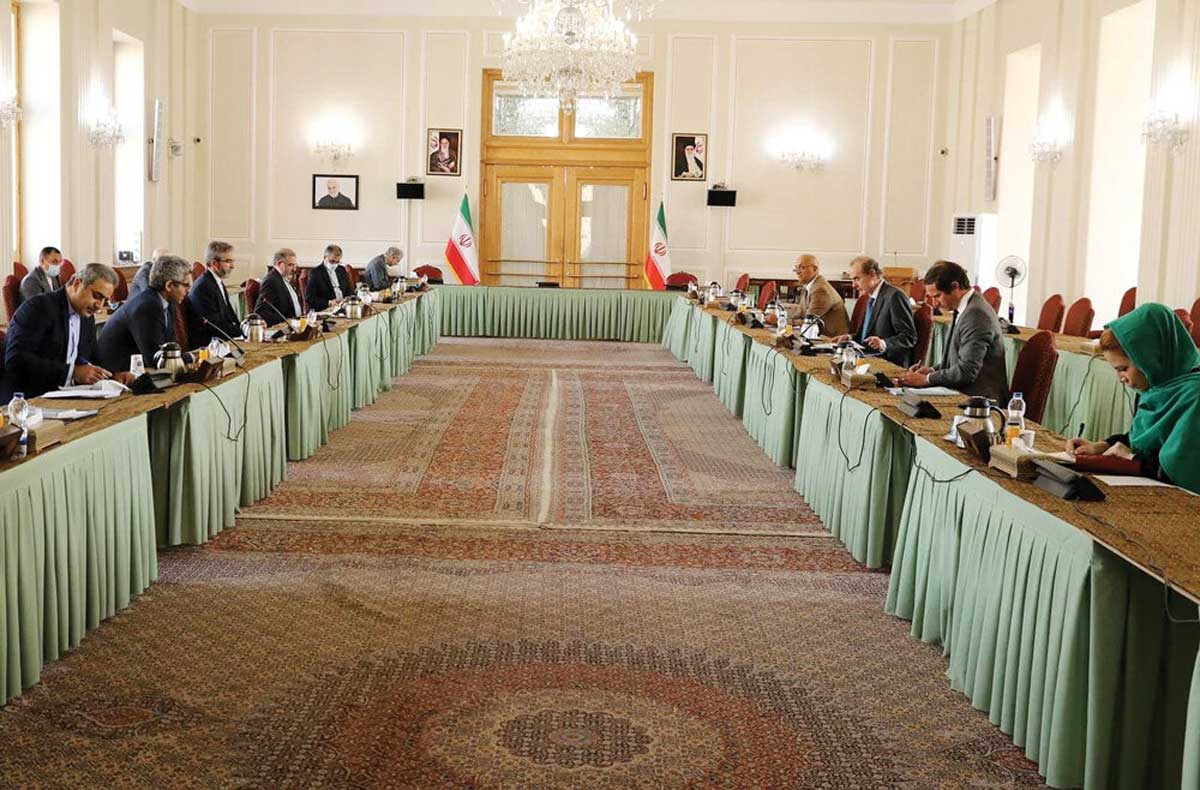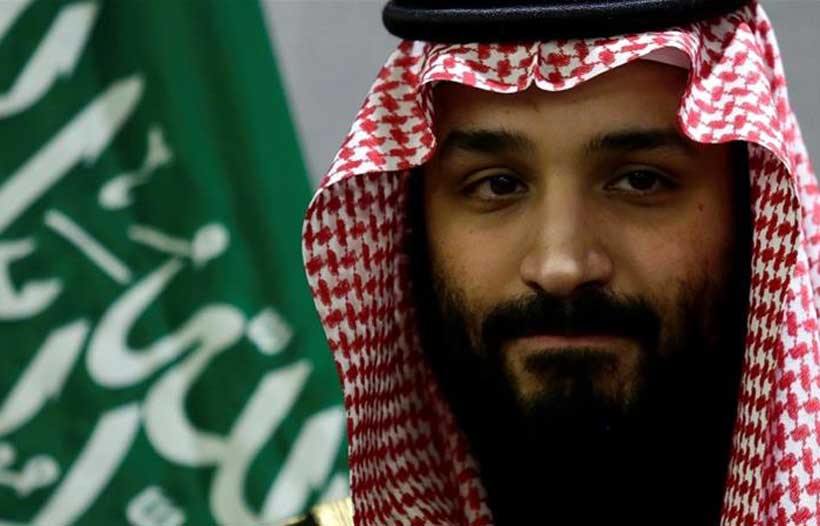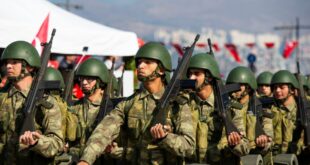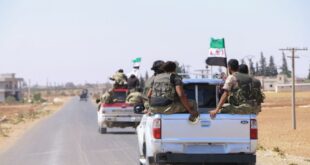The future of US engagement in the Middle East hangs in the balance.
Two decades of forever war in Afghanistan and continued military engagement in Iraq and elsewhere in the region have prompted debate about what constitutes a US interest in the Middle East. China, and to a lesser degree Russia, loom large in the debate as America’s foremost strategic and geopolitical challenges.
Questions about US interests have also sparked discussion about whether the United States can best achieve its objectives by continued focus on security and military options or whether a greater emphasis on political, diplomatic, economic, and civil society tools may be a more productive approach.
The debate is coloured by a pendulum that swings from one extreme to the other. President Joe Biden has disavowed the notion of nation-building that increasingly framed the United States’ post-9/11 intervention in Afghanistan.
There is no doubt that the top-down nation-building approach in Afghanistan was not the way to go about things. It rested on policymaking that was informed by misleading and deceitful reporting by US military and political authorities and enabled a corrupt environment for both Afghans and Americans.
The lesson from Afghanistan may be that nation-building (to use a term that has become tainted for lack of a better word) has to be a process that is owned by the beneficiaries themselves while supported by external players from afar.
Potentially adopting that posture could help the Biden administration narrow the gap between its human rights rhetoric and its hard-nosed, less values-driven definition of US interests and foreign policy.
A cursory glance at recent headlines tells a tale of failed governance and policies, hollowed-out democracies that were fragile to begin with, legitimisation of brutality, fabrics of society being ripped apart, and an international community that grapples with how to pick up the pieces.
Boiled down to its essence, the story is the same whether it’s how to provide humanitarian aid to Afghanistan without recognising or empowering the Taliban or efforts to halt Lebanon’s economic and social collapse and descent into renewed chaos and civil war without throwing a lifeline to a discredited and corrupt elite.
Attempts to tackle immediate problems in Lebanon and Afghanistan by working through NGOs might be a viable bottom-up approach to the discredited top-down method.
If successful, it could provide a way of strengthening the voice of recent mass protests in Lebanon and Iraq that transcended the sectarianism that underlies their failed and flawed political structures. It would also give them ownership of efforts to build more open, pluralistic, and cohesive societies, a demand that framed the protests. Finally, it could also allow democracy to regain ground lost by failing to provide tangible progress.
This week’s sectarian fighting along the Green Line that separated Christian East from the Muslim West in Beirut during Lebanon’s civil war highlighted the risk of those voices being drowned out.
Yet, they reverberated loud and clear in the results of recent Iraqi parliamentary elections, even if a majority of eligible voters refrained from going to the polls.
“We never got the democracy we were promised, and were instead left with a grossly incompetent, highly corrupt and hyper-violent monster masquerading as a democracy and traumatising a generation,” commented Iraqi Middle East counterterrorism and security scholar Tallha Abdulrazaq who voted only once in his life in Iraq. That was in the first election held in 2005 after the 2003 US invasion. “I have not voted in another Iraqi election since.”
Mr. Abdulrazaq’s disappointment is part and parcel of the larger issues of nation-building, democracy promotion and provision of humanitarian aid that inevitably will shape the future US role in the Middle East in a world that is likely to be bi-or multi-polar.
Former US National Security Council and State Department official Martin Indyk argued in a recent essay adapted from a forthcoming book on Henry Kissinger’s Middle East diplomacy that the US policy should aim “to shape an American-supported regional order in which the United States is no longer the dominant player, even as it remains the most influential.”
Mr. Indyk reasoned that support for Israel and America’s Sunni Arab allies would be at the core of that policy. While in a world of realpolitik the United States may have few alternatives, the question is how alignment with autocracies and illiberal democracies would enable the United States to support a bottom-up process of social and political transition that goes beyond lip service.
That question is particularly relevant given that the Middle East is entering its second decade of defiance and dissent that demands answers to grievances that were not expressed in Mr. Kissinger’s time, at least not forcefully.
Mr. Kissinger was focused on regional balances of power and the legitimisation of a US-dominated order. “It was order, not peace, that Kissinger pursued because he believed that peace was neither an achievable nor even a desirable objective in the Middle East,” Mr. Indyk said, referring to the Israeli-Palestinian conflict.
Mr. Indyk noted that in Mr. Kissinger’s mind the rules of a US-dominated order “would be respected only if they provided a sufficient sense of justice to a sufficient number of states. It did not require the satisfaction of all grievances… ‘just an absence of the grievances that would motivate an effort to overthrow the order’.”
The popular Arab revolts of 2011 that toppled the leaders of Egypt, Tunisia, Libya, and Yemen, even if their achievements were subsequently rolled back, and the mass protests of 2019 and 2020 that forced leaders of Sudan, Algeria, Iraq, and Lebanon to resign, but failed to fundamentally alter political and economic structures, are evidence that there is today a will to overthrow the order.
In his essay, Mr. Indyk acknowledges the fact that “across the region, people are crying out for accountable governments” but argues that “the United States cannot hope to meet those demands” even if “it cannot ignore them, either.”
Mr. Indyk may be right. Yet, the United States, with Middle East policy at an inflexion point, cannot ignore the fact that the failure to address popular grievances contributed significantly to the rise of violent Islamic militancy and ever more repressive and illiberal states in a region with a significant youth bulge that is no longer willing to remain passive and /or silent.
Pointing to the 600 Iraqi protesters that have been killed by security forces and pro-Iranian militias, Mr. Abdulrazaq noted in an earlier Al Jazeera op-ed that protesters were “adopting novel means of keeping their identities away from the prying eyes of security forces and powerful Shia militias” such as blockchain technology and decentralised virtual private networks.
“Unless they shoot down…internet-providing satellites, they will never be able to silence our hopes for democracy and accountability again. That is our dream,” Mr. Abdulrazzaq quoted Srinivas Baride, the chief technology officer of a decentralised virtual network favoured by Iraqi protesters, as saying.
Dr. James M. Dorsey is a senior fellow at the S. Rajaratnam School of International Studies, co-director of the University of Würzburg’s Institute for Fan Culture, and the author of The Turbulent World of Middle East Soccer blog, a book with the same title, Comparative Political Transitions between Southeast Asia and the Middle East and North Africa, co-authored with Dr. Teresita Cruz-Del Rosario and three forthcoming books, Shifting Sands, Essays on Sports and Politics in the Middle East and North Africaas well as Creating Frankenstein: The Saudi Export of Ultra-conservatism and China and the Middle East: Venturing into the Maelstrom.

Image source: Tehran Times
While the West is pressuring Iran for a return to the Vienna nuclear talks, the top Iranian diplomat unveiled a new strategy on the talks that could reset the whole negotiation process.
The Iranian parliament held a closed meeting on Sunday at which Iranian Foreign Minister Hossein Amir Abdollahian briefed the lawmakers on a variety of pressing issues including the situation around the stalled nuclear talks between Iran and world powers over reviving the 2015 nuclear deal, officially known as the Joint Comprehensive Plan of Action (JCPOA).
The Iranian foreign ministry didn’t give any details about the session, but some lawmakers offered an important glimpse into the assessment Abdollahian gave to the parliament.
According to these lawmakers, the Iranian foreign ministry addressed many issues ranging from tensions with Azerbaijan to the latest developments in Iranian-Western relations especially with regard to the JCPOA.
On Azerbaijan, Abdollahian has warned Azerbaijani President Ilham Aliyev against falling into the trap set by Israel, according to Alireza Salimi, a member of the Iranian Parliament’s presiding board who attended the meeting. Salimi also said that the Iranian foreign minister urged Aliyev to not implicate himself in the “Americans’ complexed scheme.”
In addition to Azerbaijan, Abdollahian also addressed the current state of play between Iran and the West regarding the JCPOA.
“Regarding the nuclear talks, the foreign minister explicitly stated that the policy of the Islamic Republic is action for action, and that the Americans must show goodwill and honesty,” Salimi told Fars News on Sunday.
The remarks were in line with Iran’s oft-repeated stance on the JCPOA negotiations. What’s new is that the foreign minister determined Iran’s agenda for talks after they resume.
Salimi quoted Abdollahian as underlining that the United States “must certainly take serious action before the negotiations.”
In addition, the Iranian foreign minister said that Tehran intends to negotiate over what happened since former U.S. President Donald Trump withdrew the U.S. from the JCPOA, not other issues.
By expanding the scope of negotiations, Abdollahian is highly likely to strike a raw nerve in the West. His emphasis on the need to address the developments ensuing the U.S. withdrawal from the JCPOA in May 2018 could signal that the new government of President Ayatollah Seyed Ebrahim Raisi is not going to pick up where the previous government left.
This has been a major concern in European diplomatic circles in the wake of the change of administrations in Iran. In fact, the Europeans and the Biden administration have been, and continue to be, worried about two things in the aftermath of Ayatollah Raisi taking the reins in Tehran; one is he refusing to accept the progress made during six rounds of talks under his predecessor Hassan Rouhani. Second, the possibility that the new government of Ayatollah Raisi would refuse to return to Vienna within a certain period of time.
With Abdollahian speaking of negotiation over developments since Trump’s withdrawal, it seems that the Europeans will have to pray that their concerns would not come true.
Of course, the Iranian foreign ministry has not yet announced that how it would deal with a resumed negotiation. But the European are obviously concerned. Before his recent visit to Tehran to encourage it into returning to Vienna, Deputy Director of the EU Action Service Enrique Mora underlined the need to prick up talks where they left in June, when the last round of nuclear talks was concluded with no agreement.
“Travelling to Tehran where I will meet my counterpart at a critical point in time. As coordinator of the JCPOA, I will raise the urgency to resume #JCPOA negotiations in Vienna. Crucial to pick up talks from where we left last June to continue diplomatic work,” Mora said on Twitter.
Mora failed to obtain a solid commitment from his interlocutors in Tehran on a specific date to resume the Vienna talk, though Iran told him that it will continue talks with the European Union in the next two weeks.
Source: Tehran Times
Middle East
Safar Barlek of the 21st Century: Erdogan the New Caliph
Published
2 days ago
on
October 18, 2021

Since the American’s withdrawal from Afghanistan, it became clear that everyone is holding his breath. That is exactly what Recep Tayyip Erdogan is doing these days. Ten years have passed since his war on Syria; however, he has, so far, reached zero accomplishments towards his 2023 dreams. As a matter of fact, Erdogan is in the worst position ever. His dream of becoming the new Ottoman Caliph began to fade away.
If we want to understand what is going on in his mind, it is crucial to follow Gas and Oil pipelines: He actively participated in the war on Syria because Syrian President Bashar al-Assad refused to betray his Russian and Iranian friends by allowing the Qatari gas pipelines to pass through Syria then Turkey to reach Europe. Such a step would have empowered Turkey, opened a wide door for it to enter the gas trade industry, and would become the American’s firmed grip around the Iranian and Russian necks.
He saw the opportunity getting closer as the war on Syria was announced. He imagined himself as the main player with the two strongest powers globally: the U.S. and Europe. Hence, his chance to fulfil the 1940s Turkish- American plan to occupy northern Syria, mainly Aleppo and Idlib, where he could continue all the way to al-Mussel in Iraq, during the chaos of the futile war on ISIS seemed to be reachable. By reaching his aim, Erdogan will be able to open a corridor for the Qatari gas pipelines and realize the dream of retrieving the legacy of the old Turkish Petroleum Company, which was seized to exist after the collapse of the Ottoman Empire in 1925.
Consequently, Erdogan announced his desire to establish a 15 km deep buffer zone along the Syrian borders and inside the Syrian territory. This is in fact, an occupation declaration, which will definitely enable him to reach the Syrian oil and gas fields. He even tried to offer the Russians a compromise that he would like to share managing these fields with them after Donald Trump’s announcement of withdrawing the American troops from Syria in 2018.
It was clear since the year 2019, after attacking the Kurds in east-north Syria, that he has lost the Americans and European support in the region. Especially after inking the Russian missiles S400 deal against the American’s will. Then he supported Azerbaijan against Armenia, threatening both Iranian and Russian security.
The situation was repelled with Iran when he recited a poem on the 11th of December 2020, which could have provoked the feelings of the Azeris and incited them to secede from Iran. On the 28th of February 2021, he even accused Iran of harboring the Kurdistan Workers’ Party, which Turkey considers a terrorist organization.
Now the situation is escalating again. A few days ago, the Iranian Army’s Ground Force launched the “Fatih Khyber” maneuvers in the northwest of the country near the border with Azerbaijan, with the participation of several Armored Brigade, 11th Artillery Group, Drones group, and 433rd Military Engineering Group, with the support of airborne helicopters. A major maneuver that indicates there is an escalation between Iran and Azerbaijan, which is taking place under Turkish auspices. The escalation is an attempt to threaten Iran’s security from the north.
When Dr. Mohsen Fakhrizadeh, the Iranian nuclear scientist, was assassinated at the end of last year, the American newspaper New York Times described the deed as “the most brilliant work of the Mossad”. At that time, many resources revealed that the executors of the operation passed to Iran through Azerbaijan and were situated in Turkey for a while before moving. And now Iran has great concerns because of Azerbaijan hostess of active Israeli and American intelligence members.
As Iran is going now to another stage of nuclear talks with G5+1, it is an opportunity for the American and Turkish interests to meet again, as Erdogan is pushing towards achieving a victory in the region, and the Americans are trying to create trouble to distract it. We know what the Americans want, but what matters here is what Erdogan wants.
Erdogan wants to be a bigger participant in the Azeri oil industry. He wants to push Iran into aiding him to give him more space in the Syrian lands. He wants to be given a chance to save face and be granted some kind of victory in his “War on Syria”. It is his wars that he is leading in Libya, Sudan, the Mediterranean Sea, and now in Afghanistan and Azerbaijan. Erdogan was preparing himself to become the first of the new coming rein of the new Ottoman Sultanate in 2023.
2023 is the date for two important occasions; the first is the Turkish presidential elections. And the second is the end of the Treaty of Lausanne 1923. Erdogan had high hopes that he would be able to accomplish a lot before the designated date. In involving Turkey in every trouble in the Arab country since the “Arab Spring” had begun. He has an agenda in each of them, from Syria to Libya, to the Mediterranean Sea, to where he seeks to preserve the Turkish right for expansion.
Erdogan believed in building double alliances between Russia and Iran from one side and the United States through Turkey’s presence in NATO from the other, he can manipulate everyone to achieve his goal in Syria and secure the Buffer Zone. He started a policy of Turkification in northern Syria, which is against international law in occupied regions and countries. In addition, as he is still politically maneuvering to reach this goal, he is becoming more like a bull chasing a red carpet. He is backstabbing everyone, even his allies in Nusra.
Erdogan, the paranoid, has used every possible method to rally aggregations against local governments and authorities in each country as he built his alliances. In Syria, he played on sectarian differences to rally Sunnis and, in particular, on Muslim Brotherhood groups to build alliances against the current Syrian government. He imported terrorists from al-Nusra, armed them, and ideologically manipulated terrorists from Tajikistan, Uzbekistan, Kyrgyzstan, and the Chinese Xinjiang, into fighting in Syria in the name of Islam against the Alawites “regime”. He represented himself as the protector of Sunnis. In order to justify bombarding the Kurds, he was playing on nationalistic feelings.
In Libya, he played on empowering the Muslim Brotherhoods against other atheist groups, as he rates them. He empowered the al-Wifaq government along with the Americans to pave the way to dividing Libya, where the dirty international game almost tore the country apart using terrorist groups financially backed by Saudi Arabia, the United Arab Emirates, and Turkey, i.e. Qatar.
In Lebanon, he presented himself as the protector of the injustice Sunnis. Turkish intelligence paid around four million dollars to regroup Sunnis in Said and Tripoli. The same thing was going on with Hamas in Palestine in the name of the freedom of the Palestinians and their fight against Israel. In the Arab countries, Erdogan worked hard to be designated as the new Muslim leader and was very careful not to be perceived as a Turk but as a Muslim. And now the same game is going in Azerbaijan.
Erdogan’s interference in Azerbaijan does not fall out of the American expected Turkish role. A few days ago, a congress member praised the important role Turkey is playing within NATO. It is not a language of reconciliation; it is a language of playing on Erdogan’s ego. Therefore, it is only fair to question the Turkish role in Azerbaijan, in particular to the relation between the two mentioned countries and Israel.
Iran has been dealing with the two countries with tolerance, as neighboring countries, particularly Turkey, who is playing in this case on the nationalistic feelings of the Azeris in Iran to start trouble, in the least expression. It is clear, if the situation escalates with Azerbaijan, Iran would be walking through land mines. Therefore, it needs to be carefully leading its diplomatic negotiations. On the other hand, Iran knows, but it needs to acknowledge that as long as Turkey occupies one meter in northern Syrian, the region will never know peace and security. The first step to get the Americans out of Iraq and Syria will be to cut Erdogan’s feet in Syria, once and for all.
In leading his quest for victory, Erdogan moved the terrorist around the region. Now he is filling Azerbaijan with these mercenary terrorists from the Arab region and center of Asia, just like the Ottoman when they dragged the compulsorily recruited soldiers from their villages and houses from all over the Arab countries to fight their war in the Baltic region. A dream that needs to put an end to it. The Syrians believe that it ends with ending the Turkish occupation in Idlib. However, it is important that their friends believe that too.
*The Safar Barlek was the mobilization effected by the late Ottoman Empire during the Second Balkan War of 1913 and World War I from 1914 to 1918, which involved the forced conscription of Lebanese, Palestinian, Syrian, and Kurdish men to fight on its behalf.
From our partner Tehran Times
Middle East
The Absence of Riyadh in the Turbulent Afghanistan
Published
4 days ago
on
October 15, 2021

As the situation in Afghanistan becoming increasingly turbulent, the NATO allies led by the United States are fully focused on military withdrawal. As this has to be done within tight deadline, there have been some disagreements between the United States and the European Union. Josep Borrell, High Representative of the European Union for Foreign Affairs and Security, publicly accused the U.S. military in Afghanistan, which was responsible for the internal security of Kabul Airport, of deliberately obstructing the EU evacuation operations.
China and Russia on the other hand, are more cautious in expressing their positions while actively involving in the Afghanistan issue. This is especially true for Russia, which after both the Taliban and the anti-Taliban National Resistance Front of Afghanistan (NRF) led by Ahmad Massoud have pleaded Russia for mediation, Moscow has now become a major player in the issue.
Compared with these major powers, Saudi Arabia, another regional power in the Middle East, appears to be quite low-key. So far, only the Ministry of Foreign Affairs of Saudi Arabia has issued a diplomatic statement on the day after the Taliban settled in Kabul, stating that it hopes the Taliban can maintain the security, stability and prosperity of Afghanistan. Considering the role that Saudi Arabia has played in Afghanistan, such near silent treatment is quite intriguing.
As the Taliban were originally anti-Soviet Sunni Jihadists, they were deeply influenced by Wahhabism, and were naturally leaning towards Riyadh. During the period when the Taliban took over Afghanistan for the first time, Saudi Arabia became one of the few countries in the international community that publicly recognized the legitimacy of the Taliban regime.
Although the Taliban quickly lost its power under the impact of the anti-terror wars initiated by the George W. Bush administration, and the Saudis were pressured by Washington to criticize the Taliban on the surface, yet in reality they continuously provided financial aid to the Taliban and the Al-Qaeda organization which was in symbiotic relations with the Taliban.
However, after 2010, with the Syrian civil war and the rise of the Islamic State, the Riyadh authorities had decreased their funding for their “partners” in Afghanistan due to the increase in financial aid targets.
In June 2017, after Mohammed bin Salman became the Crown Prince of Saudi Arabia and took power, Saudi Arabia’s overall foreign policy began to undergo major changes. It gradually abandoned the policy of exporting its religious ideology and switched to “religious diplomacy” that focuses on economic, trade and industrial cooperation with main economies. Under such approach, Saudi Arabia’s Afghanistan policy will inevitably undergo major adjustments.
With the reformation initiated by the Crown Prince, Saudi Arabia has drastically reduced its financial aid to the Taliban. In addition, Riyadh also further ordered the Taliban to minimize armed hostilities and put its main energy on the path of “peaceful nation-building”. This sudden reversal of the stance of Saudi Arabia means that Riyadh has greatly weakened the voices of the Taliban in the global scenes.
In recent years, the Taliban have disassociated with Saudi Arabia in rounds of Afghanistan peace talks. After Kabul was taken over by the Taliban on August 19, a senior Taliban official clearly stated that the Taliban does not accept Wahhabism, and Afghanistan has no place for Wahhabism. Although this statement means that Al-Qaeda’s religious claims will no longer be supported by the Taliban, it also indicates that the Taliban has reached the tipping point of breaking up with Riyadh.
Under such circumstance, for the Riyadh authorities under Mohammed bin Salman, the most appropriate action is probably wait-and-see as Afghanistan changes again.
 Geostrategic Media Political Commentary, Analysis, Security, Defense
Geostrategic Media Political Commentary, Analysis, Security, Defense





